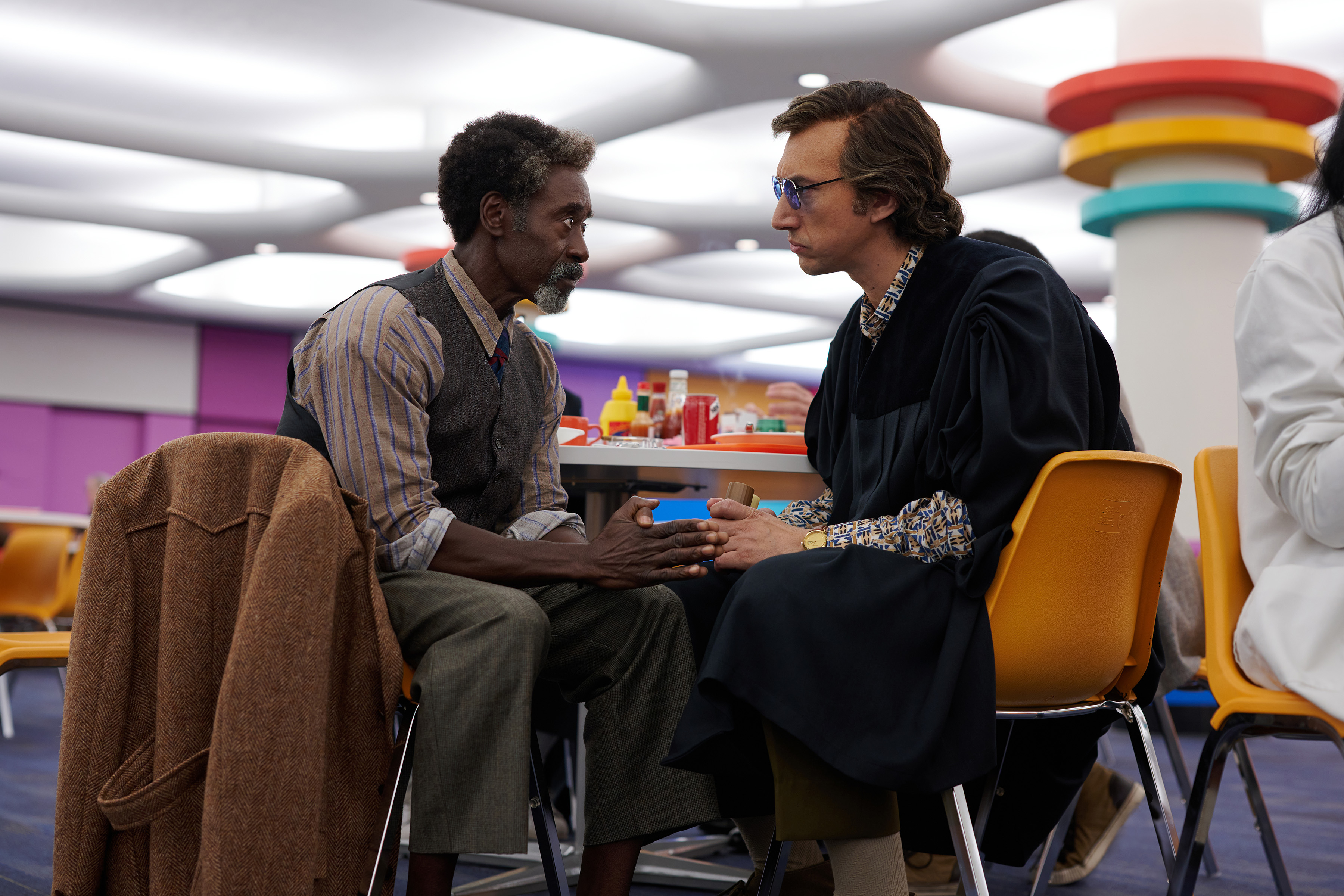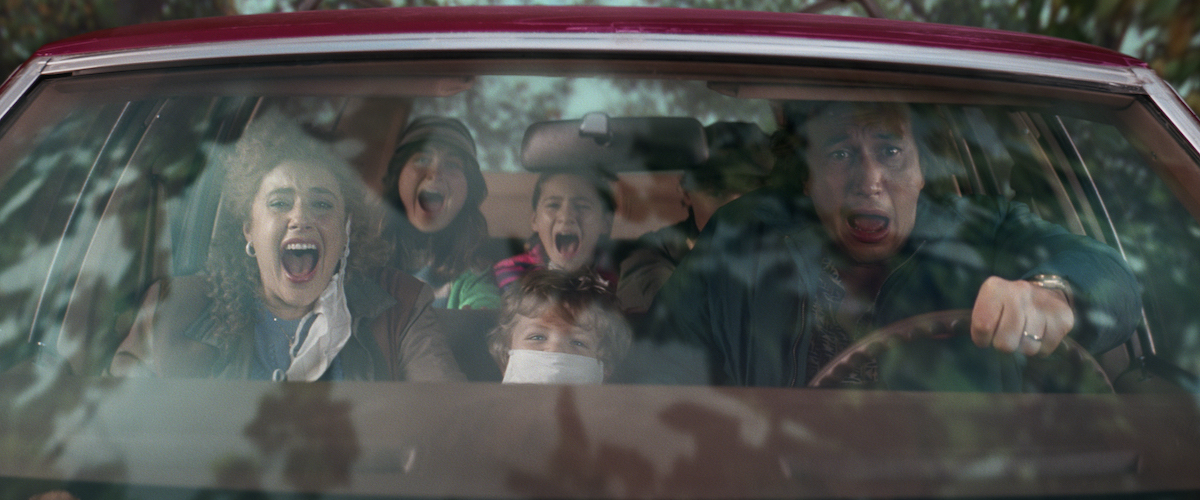Noah Baumbach’s latest might be a work of mad genius, a work of pure madness, or merely a pseudo-intellectual trifle in an epic-sized package. Whatever the case may be, the departure from the writer-director’s normal mode of realism is stark. One might predict this outcome in an adaptation of a Don DeLillo novel, but one would never predict it coming from the man who’s giving it to us here, who has rarely strayed from the fireworks of interpersonal relationships in his previous films. Here Baumbach is giving us high-concept storytelling fireworks that have traditionally been anathema to his oeuvre.
White Noise actually showcases an insane commitment to realism in one respect, given that the production designers have devoted more energy to recreating a specific era – 1983, as proven by the movie Krull on a cinema marquee – than any recent film you can remember. An entire A&P grocery store is a recurring set, with the camera traveling down aisle after aisle, taking in every product a real 1983 grocery store would have on its shelves, with all the original 1983 packaging lovingly recreated, or possibly exhumed from the pantry of a recently deceased octogenarian. How Baumbach employs these realistic components, though, is anything but.
White Noise focuses on one central family, featuring Adam Driver as Jack Gladney, a professor in “Hitler studies,” who lives with his fourth wife, Babette (Greta Gerwig). (Their station wagon’s licence plate says this is Ohio.) Jack is also Babette’s fourth husband, and the four kids who live with them include two from one of his previous marriages, one from one of hers, and the youngest, whom they conceived together. The oldest boy Heinrich (Sam Nivola) is always nattering on about something, offering a near perfect imitation of Jesse Eisenberg, who starred in the early Baumbach film The Squid and the Whale. The oldest girl Denise (Raffey Cassidy) is a bit of a snoop and a hard-ass. They all talk kind of like university professors, which has always been a bit of a weakness of Baumbach’s writing.
The story starts out insufferably, fixated on this weird academic field Gladney is pioneering. Another professor at the university, Murray Siskind (Don Cheadle), wants to start a field of “Elvis studies,” and for a while they compete. The opening 15 minutes are disorienting in a way that serves as one of the clearest encapsulations of a Don DeLillo novel. This passage has a preoccupation with fears of death, and a shadowy figure in his bedroom even tries to kill Jack, in what may be the first horror trope Noah Baumbach has ever used.
Strangely, though, White Noise starts to take shape as it starts to lose whatever shape we thought we expected. The narrative goes off in all sorts of different directions, but there are two that give it the most structure. The funniest and most enjoyable is an “airborne toxic event” that occurs when a flammable tanker truck crashes into a train carting some sort of chemical waste, forcing all the local citizens to flee. The second has to do with a medication Babette is secretly taking called Dylar, which leaves her behaving erratically, and which no doctors or chemists have ever heard of.
However the various moments in White Noise hit for any particular viewer, the overall creative effort is indisputably invigorating. Baumbach made one of his best films with another recent Driver collaboration, Marriage Story, before tackling what is undoubtedly his most ambitious to date. This suggests a filmmaker who isn’t content to stay in his lane, and adapting the notoriously difficult DeLillo is one way to prove that. This property was previously optioned by James L. Brooks and Barry Sonnenfeld, both directors who have shown more of an interest in absurdity. Baumbach’s humour has always come from being relatable, until now.
Then again, the core of what he’s exploring here is relatable. It all comes down to that obsession with death, which starts out the movie feeling like an intellectual indulgence, before we have really met these characters and grasped their literal place within this very specifically depicted environment, or their spiritual place. As the movie gives us more of that, its themes start to coalesce into something far more resonant.
White Noise is the sort of movie it’s difficult to smack with an immediate banal judgment in terms of a rating out of ten. The mere fact of needing to process it, maybe for weeks after seeing it, suggests greatness. However, the movie also feels like a car careening out of control for most of its running time. The family car literally careens out of control as the centrepiece of fleeing the airborne toxic event, a section of the film that recalls the confrontational absurdity of one of Adam McKay’s recent political films, maybe even something like Darren Aronofsky’s mother! However, the film then switches gears (to continue the car metaphor) and looks more soberly at the affliction that Babette may be suffering. You can never get a firm hold on the changing tones, which might simultaneously be a strength and a weakness.
Just as Driver proved an essential collaborator on Marriage Story, he’s key to this film’s schizophrenic nature, and he’s proven his commitment to Baumbach by doing his first weight gain for a role in an already lauded career. There’s both something oppressive about this man (he’s obsessed with Hitler) and something lightweight and easygoing (he brushes off the very real threat of impending toxic calamity). While his role might be understood as primarily comedic, Gerwig’s is primarily serious, as she produces depths of suffering that again leave us taken aback about the sort of film we thought we were watching.
So how to issue that elusive numerical rating on the quality of White Noise? Close your eyes and pick one, maybe. Given Baumbach’s new embrace of chaos, he might also like that his movie defies easy assessment. If it were clearly one thing or clearly another thing, you could use the success of similar films to help land on a definitive ruling about White Noise. But it isn’t. The mere fact of its head-scratching intrigue, though, should influence adventurous critics and viewers in Baumbach’s favour.
White Noise is now streaming on Netflix.



